Introduction to Aoomaal
In the rapidly evolving world of technology, staying ahead of the curve is crucial. At Aoomaal, we understand that the intersection of technology and innovation shapes the future of industries worldwide. Our goal is to provide you with a comprehensive understanding of the latest trends, groundbreaking advancements, and emerging technologies that are transforming the digital landscape. This article will delve into key areas such as emerging technologies, industry trends, and future projections to keep you informed and equipped to navigate the ever-changing tech environment.
Emerging Technologies Shaping the Future
First and foremost, emerging technologies are at the forefront of driving innovation and progress. Among these technologies, Artificial Intelligence (AI) stands out as a transformative force. Specifically, AI is revolutionizing various sectors by enabling machines to learn from data, make decisions, and perform tasks that traditionally required human intelligence. Notably, AI applications span across healthcare, finance, automotive, and many other industries, thus improving efficiency and creating new opportunities.
Similarly,
Artificial Intelligence and Machine Learning
Artificial Intelligence (AI) and Machine Learning (ML) are closely linked yet distinct fields. While AI covers a broad range of technologies that replicate human intelligence, ML specifically involves algorithms that enable systems to learn from data and improve over time. For example, advancements in natural language processing (NLP) have produced sophisticated chatbots and virtual assistants that enhance customer interactions and streamline business processes.
In addition,
Blockchain Technology
Blockchain technology is rapidly gaining traction due to its ability to secure and transparently manage transactions. Specifically, this decentralized ledger technology supports cryptocurrencies like Bitcoin and Ethereum, providing a robust framework for managing digital assets. Moreover, Blockchain also holds promise for applications beyond finance, such as supply chain management, voting systems, and healthcare data security.
Furthermore,
Internet of Things (IoT)
The Internet of Things (IoT) connects everyday objects to the internet, allowing them to collect and exchange data. Consequently, IoT devices, ranging from smart home appliances to industrial sensors, boost operational efficiency and offer valuable insights. As a result, as IoT technology evolves, it integrates with AI and ML to create smart environments that adapt to user needs and optimize resource usage.
Turning to broader trends,
Industry Trends Influencing Technology
Several key trends are shaping technology adoption and innovation. To begin with, the focus on sustainability and environmental responsibility drives the development of green technologies and eco-friendly practices. In particular, companies now invest in renewable energy sources, energy-efficient devices, and sustainable materials to cut their carbon footprint.
Additionally,
Rise of Remote Work and Digital Transformation
The rise of remote work has accelerated digital transformation across industries. For instance, organizations leverage cloud computing and collaboration tools to support remote work and maintain productivity. As a result, this shift has led to the adoption of technologies like virtual private networks (VPNs), video conferencing platforms, and project management software to facilitate a distributed workforce.
Cybersecurity Challenges and Solutions
As technology advances, so do cybersecurity threats. The increasing frequency of cyber-attacks demands robust security measures to protect sensitive data and systems. Companies now implement advanced cybersecurity solutions such as multi-factor authentication (MFA), encryption, and threat intelligence to prevent breaches and ensure data integrity.
Advancements in 5G Technology
The rollout of 5G technology is set to revolutionize connectivity and communication. 5G networks deliver significantly higher speeds, lower latency, and greater capacity compared to previous generations. This advancement will drive the development of smart cities, autonomous vehicles, and advanced industrial applications that depend on fast and reliable data transmission.
Future Projections and Innovations
Looking ahead, aoomaal innovations are poised to shape the future of technology. Quantum Computing, for instance, represents a major shift in computational power. Quantum computers use quantum bits (qubits) to solve complex problems that current classical computers cannot tackle. This technology could transform fields like cryptography, drug discovery, and optimization.
Advances in Augmented Reality (AR) and Virtual Reality (VR)
Augmented Reality (AR) and Virtual Reality (VR) technologies are advancing quickly, offering immersive experiences and new applications. AR enhances the real world by overlaying digital information, while VR creates entirely virtual environments. These technologies find applications across sectors such as entertainment, education, and training, delivering interactive and engaging experiences.
Development of Smart Cities
The concept of smart cities is gaining momentum as urban areas seek to integrate technology to enhance quality of life. Smart cities use IoT devices, data analytics, and automation to improve urban infrastructure, manage resources efficiently, and provide better services to residents. From intelligent traffic management systems to smart energy grids, smart cities aim to create more sustainable and efficient urban environments.
Conclusion
In conclusion, staying informed about the latest trends and advancements in technology is essential for navigating the future. At Aoomaal, we are dedicated to providing you with insightful and up-to-date information on emerging technologies, industry trends, and future projections. By understanding and embracing these innovations, you can make informed decisions and stay ahead in a rapidly changing world.











